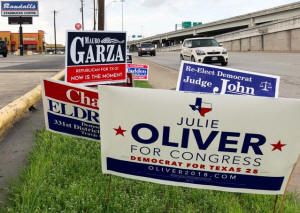|
U.S. primaries start with Democratic push
in Texas
 Send a link to a friend
Send a link to a friend
 [March 06, 2018]
By Jon Herskovitz [March 06, 2018]
By Jon Herskovitz
AUSTIN, Texas (Reuters) - The 2018 U.S.
primary elections kick off on Tuesday in Texas, where Democrats hope
record-high levels of early voter midterm turnout and anger over
President Donald Trumpís policies will help them flip congressional
seats from Republican control.
Democratic turnout in the state's largest 15 counties hit 465,245 in
early voting, according to the Texas secretary of state. That was double
the party's early voting totals for the 2014 midterm election and
surpassed the 420,329 people who voted early in this year's Republican
nominating contest.
Texas Democrats, however, have not won a statewide race for posts such
as governor or U.S. senator for more than two decades, and analysts
expect Republican turnout to top that of Democrats on Election Day in a
state where Republicans outnumbered Democrats in 2014 primary votes by a
more than two-to-one margin.
"Every two years the Democrats find some sort of factoid to fixate on
and convince themselves that this is the year where they make Texas
competitive - and every two years it falls flat," said Chris Wilson, a
pollster for U.S. Senator Ted Cruz and Governor Greg Abbott, both Texas
Republicans.

Texas Democrats are fielding their largest contingent of congressional
and legislative candidates in a primary in several decades. For the
first time in more than 25 years, the party will be contesting each of
the stateís 36 U.S. congressional districts, the party said.
Democrats, who need 24 seats nationwide to take control of the U.S.
House, see the party's best opportunities in the six Republican-held
districts where incumbents are not seeking re-election. They also are
targeting at least two Republican incumbents whose support bases have
weakened, in part due to shifting demographics.
Trump has been divisive in Texas, where he receives about 83 percent
approval among Republican respondents and 85 percent disapproval among
Democrat respondents, according to polling from the Texas Politics
Project at the University of Texas.
Some of the issues that helped Trump nationally, such as reworking trade
deals like NAFTA, can be vulnerabilities in Texas, where the stateís
economy is heavily dependent on trade with neighbor Mexico. His plans to
crack down on immigrants have spurred political activism among Latinos,
who make up about 40 percent of the state's population and tend to
support Democrats.
[to top of second column]
|

Political campaign signs stand outside a polling station in Austin,
Texas, United States March 5, 2018 ahead of the first statewide U.S.
primary, which will be held in Texas. REUTERS/Jon Herskovitz

"Donald Trumpís presence in the White House is motivating a subset
of Democratic voters and independents to turn out to vote to express
their opposition to his administration," said Mark Jones, a
political science professor at Rice University in Texas.
Cruz and Abbott, the top Republicans facing primaries on Tuesday,
have used the Democratic surge in early voting in appeals to party
faithful to go out to the polls.
The two incumbents are expected to easily win and then drive the
party ticket in November. Abbott already has a war chest of about
$43 million, more than the combined funds at this point of every
Democratic candidate running in the state for governor, lieutenant
governor and the U.S. Congress.
The best-funded Democratic candidate is Beto O'Rourke, a U.S. House
member running for the U.S. Senate. Fluent in Spanish, O'Rourke has
been drawing big crowds across the state as he calls for universal
healthcare, new restrictions on gun ownership and immigration
reform.
Cal Jillson, a political analyst at Southern Methodist University in
Dallas, said that although O'Rourke is a long shot to beat Cruz,
Democrats are poised to narrow the electoral gap in Texas.
"If Democrats are able to pick up one or two U.S. House seats
previously held by Republicans and cut into Republican margins in
the state legislature ... that would show that the party's 'blue
wave' is no mirage," he said.
(Reporting by Jon Herskovitz; additional reporting by Jim Forysth in
San Antonio; editing by Colleen Jenkins and Jonathan Oatis)
[© 2018 Thomson Reuters. All rights
reserved.]
Copyright 2018 Reuters. All rights reserved. This material may not be published,
broadcast, rewritten or redistributed.
Thompson Reuters is solely responsible for this content.
 |